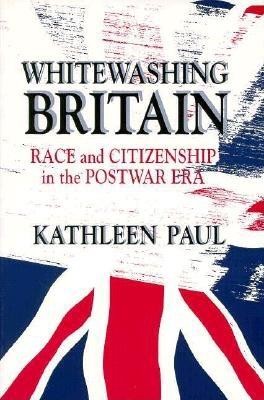
- We will send in 10–14 business days.
- Author: Kathleen Paul
- Publisher: Cornell University Press
- ISBN-10: 0801484405
- ISBN-13: 9780801484407
- Format: 15.3 x 23 x 1.7 cm, softcover
- Language: English
- SAVE -10% with code: EXTRA
Reviews
Description
Kathleen Paul challenges the usual explanation for the racism of post-war British policy. According to standard historiography, British public opinion forced the Conservative government to introduce legislation stemming the flow of dark-skinned immigrants and thereby altering an expansive nationality policy that had previously allowed all British subjects free entry into the United Kingdom. Paul's extensive archival research shows, however, that the racism of ministers and senior functionaries led rather than followed public opinion.
In the late 1940s, the Labour government faced a birthrate perceived to be in decline, massive economic dislocations caused by the war, a huge national debt, severe labor shortages, and the prospective loss of international preeminence. Simultaneously, it subsidized the emigration of Britons to Australia, Canada, and other parts of the Empire, recruited Irish citizens and European refugees to work in Britain, and used regulatory changes to dissuade British subjects of color from coming to the United Kingdom. Paul contends post-war concepts of citizenship were based on a contradiction between the formal definition of who had the right to enter Britain and the informal notion of who was, or could become, really British.
Whitewashing Britain extends this analysis to contemporary issues, such as the fierce engagement in the Falklands War and the curtailment of citizenship options for residents of Hong Kong. Paul finds the politics of citizenship in contemporary Britain still haunted by a mixture of imperial, economic, and demographic imperatives.
EXTRA 10 % discount with code: EXTRA
The promotion ends in 18d.21:38:55
The discount code is valid when purchasing from 10 €. Discounts do not stack.
- Author: Kathleen Paul
- Publisher: Cornell University Press
- ISBN-10: 0801484405
- ISBN-13: 9780801484407
- Format: 15.3 x 23 x 1.7 cm, softcover
- Language: English English
Kathleen Paul challenges the usual explanation for the racism of post-war British policy. According to standard historiography, British public opinion forced the Conservative government to introduce legislation stemming the flow of dark-skinned immigrants and thereby altering an expansive nationality policy that had previously allowed all British subjects free entry into the United Kingdom. Paul's extensive archival research shows, however, that the racism of ministers and senior functionaries led rather than followed public opinion.
In the late 1940s, the Labour government faced a birthrate perceived to be in decline, massive economic dislocations caused by the war, a huge national debt, severe labor shortages, and the prospective loss of international preeminence. Simultaneously, it subsidized the emigration of Britons to Australia, Canada, and other parts of the Empire, recruited Irish citizens and European refugees to work in Britain, and used regulatory changes to dissuade British subjects of color from coming to the United Kingdom. Paul contends post-war concepts of citizenship were based on a contradiction between the formal definition of who had the right to enter Britain and the informal notion of who was, or could become, really British.
Whitewashing Britain extends this analysis to contemporary issues, such as the fierce engagement in the Falklands War and the curtailment of citizenship options for residents of Hong Kong. Paul finds the politics of citizenship in contemporary Britain still haunted by a mixture of imperial, economic, and demographic imperatives.


Reviews